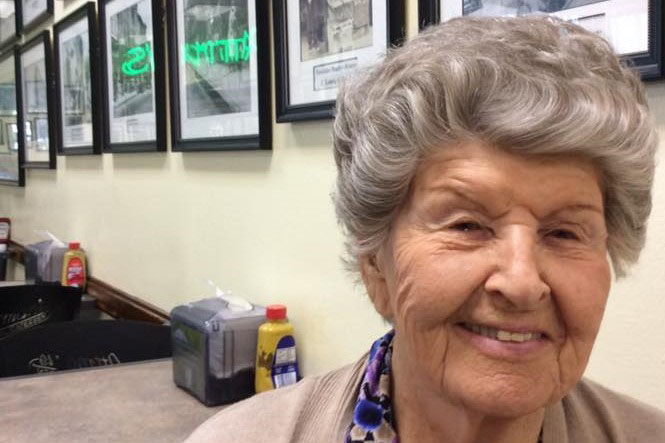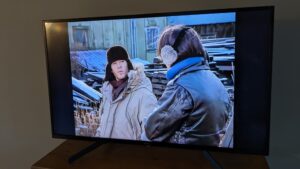“If I wouldn’t believe in God, I wouldn’t live. If I tell you it’s true, it’s true …”
— Frieda Granat, Holocaust survivor
Last month, I gave a talk to nearly 300 women at Beth El for the 70th anniversary of the Pikesville congregation’s sisterhood. Looking out upon the many faces (and beauty parlor hairdos!), I said that while a few hundred people sat before me, I saw “a million stories” and would write every one of them if I could.
I told the ladies tales of old Lombard Street — chicken houses and barrels of herring, people named Ludgie and Briny and Irving — always a winning subject with Baltimoreans of a certain age, whether Jew or gentile.
During the schmooze-fest afterward, a woman named Terry Lafferman approached as I was signing books. Terry said that her mother — a vibrant 92 and survivor of the Bergen-Belsen and other concentration camps — once lived atop a Lombard Street deli back when the great warrior Eisenhower was president.
And in two shakes of a half-sour pickle, I found myself laughing and crying with a beautiful woman named Frieda Granat in the Kibitz Room of Attman’s Delicatessen, one of her long-ago competitors when she and husband Israel (who had endured Auschwitz) ran Weiss Deli down the street.
“Harry Attman wanted to know why we cut our sammich prices by a nickel,” said Frieda, a mother of three, grandmother of six and great-grandmother of two. “We told him we have also to make a living.”
The challenge of interviewing a Holocaust survivor, which I have had the privilege of doing a handful of times (highlighted by long conversations with Rabbi Amrom Taub, of blessed memory), is that the war dominates every other chapter of the person’s life.
“I survived because I wanted to be survived. Lots of girls killed themselves,” said Frieda, who was taken from her Czech home near the Carpathian Mountains at age 15 and freed three years later. Her parents and three siblings did not survive.
But on this day — admiring a pastrami sandwich as thick as her accent, “same I used to make,” she said — Frieda preferred talking about her early life in America in the 1100 block of E. Lombard St. and, in almost every other sentence, her first husband.
Israel F. Stern and the former Frieda Henig were married at a refugee camp in Gailingen, Germany, shortly after the war. They had children both in post-war Germany and also in the United States.
Stern died at the age of 48 of heart failure in 1968, the same year that the King assassination riots ravaged Corned Beef Row. Having found happiness in the wake of countless atrocities only to see it vanish a short time later, Frieda almost lost her mind.
“We lived on the third floor of the deli,” said Frieda, noting that the family for whom the store remains named — also Holocaust survivors — had sponsored the Sterns’ arrival and lived on the second floor. “Our [Shabbos goy] was a boy named Jackie, very nice. I always give him something extra from the store.”
“It was dark and scary in the stairway going up to the third floor,” said daughter Terry, not yet in kindergarten when she scooted up and down the steps from the deli to the family’s apartment.
Frieda’s eyes twinkled as she remembered Jackie, who like members of the Weiss family have been lost to her over time. But Israel, the first of three husbands she has outlived, the Owings Mills resident conjures as though he were slicing corned beef again at her side.
Several years before Israel’s death, the Sterns amicably parted ways with the Weiss family and left 1127 E. Lombard St. for a much bigger business five blocks east in the Inner Harbor. The new business was Middleman & Weise, a wholesaler of candy and tobacco established during World War I. At the time Mr. Stern bought the business, it stood at 606 E. Lombard St.
The address didn’t ring any bells for me like Market Place, where my Spanish grandfather bought Christmas Eve red snapper or the 700 block of E. Pratt St., once home to Connolly’s on Pier Five, the favorite oyster house of William Donald Schaefer.
“It was next to where the Holocaust Memorial is now,” said Terry.
“Right there,” said Frieda.
Rafael Alvarez can be reached via orlo.leini@gmail.com.





